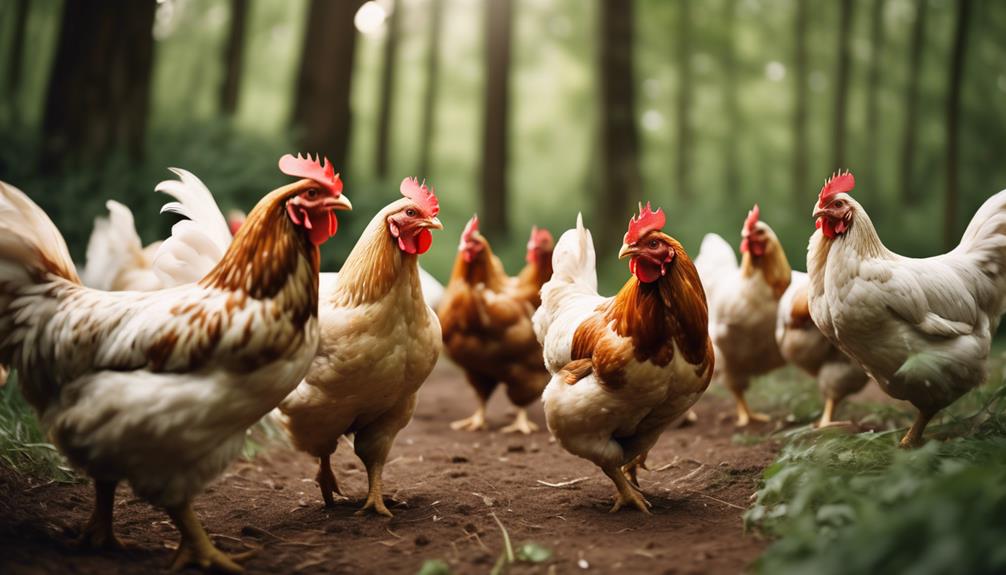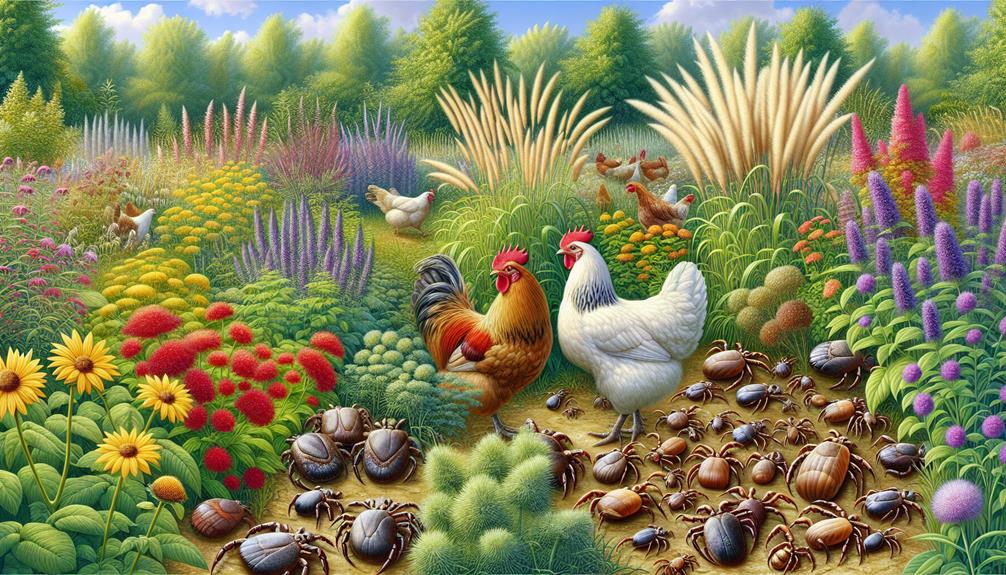Tired of those persistent ticks invading your property and causing trouble? Well, what if I told you that there's a simple, natural solution right in your own backyard?
Picture this: a creature with an insatiable appetite for bugs, capable of devouring hundreds of ticks in a single day. That's right, we're talking about chickens – the ultimate tick-eating machines.
In this article, we'll explore the incredible benefits of using chickens for tick control, the other pesky bugs they can help eliminate, and provide you with valuable tips to maximize their effectiveness.
But that's not all; we'll also delve into the limitations of relying solely on chickens for tick control and explore natural repellents and treatment options to ensure a safe environment for your chickens.
So, if you're ready to discover a sustainable and organic solution to your tick problem, this discussion is for you.
Key Takeaways
- Chickens are natural predators of ticks and can consume a large number of ticks per day, making them effective in controlling tick populations.
- Chickens also eat other pests like fleas, which can help decrease flea populations on the property.
- Chickens attract ticks, so additional methods of pest control may be necessary for significant tick problems.
- Implementing strategies like allowing chickens to free range, using specific chicken breeds known for their foraging abilities, and using portable coops can enhance tick control efforts.
Chicken Tick Control Benefits
Chickens provide numerous benefits for tick control due to their voracious appetite and ability to consume hundreds of ticks per day. This not only helps to reduce tick populations but also offers economic advantages and environmental benefits.
When chickens feast on ticks, it eliminates the need for costly chemical treatments or professional pest control services. This can lead to significant cost savings for individuals and businesses.
Additionally, chickens offer an eco-friendly approach to tick control as they don't introduce harmful chemicals into the environment. They're a natural and sustainable solution that can be integrated into existing pest management strategies.
Other Bugs Chickens Eat
Chickens, being natural insectivores, have a diverse diet that includes a wide range of bugs. In addition to ticks, chickens also eat other common pests such as fleas. However, their impact on other bugs like chiggers may not be significant. It is important to note that chickens attract ticks just like any other bird, animal, or human. While chickens can help control tick populations, they may not solely rely on hunting ticks. Therefore, additional methods of pest control may be necessary for big tick problems. Despite this, incorporating chickens into your pest control strategy can be beneficial, especially when combined with other methods. It is also worth mentioning that the diet diversity of chickens can have an impact on their egg production. Providing chickens with a varied diet rich in insects can lead to healthier and more productive hens.
| Chicken Diet Diversity | Impact on Egg Production |
|---|---|
| Varied diet rich in insects | Healthier and more productive hens |
| Limited diet | Decreased egg production |
| Nutrient-rich feed | Optimal egg production |
Tick and Flea Infestations in Chickens

Are tick and flea infestations a concern for chickens?
Tick and flea infestations can have a significant impact on chicken health and productivity. While chickens can't get or carry Lyme disease, ticks can still transmit other diseases and harmful bacteria to them.
Fleas, on the other hand, can cause restlessness, decreased egg production, anemia, and even death in severe cases. It's crucial to address these infestations promptly to ensure the well-being of your flock.
Fortunately, there are effective natural remedies for treating tick and flea infestations in chickens. Some options include vacuuming out debris, pressure washing surfaces, sealing cracks, and using natural tick and flea repellents such as Southland Organics Desecticide, Diatomaceous Earth, and Wondercide Flea and Tick.
Tips for Chicken Tick Control
Tick and flea infestations can be a significant concern for the health and productivity of your chickens, so it's essential to implement effective strategies for chicken tick control. Here are four innovative tips to help you keep your chickens tick-free:
- Encourage chicken foraging behavior: Chickens are natural bug hunters, including ticks. Allowing them to free range on your property will give them the opportunity to hunt and consume ticks, reducing the tick population.
- Consider specific chicken breeds: Some chicken breeds, such as Ameraucana, Andalusian, Golden Comet, Brown Leghorn, and Cubalaya, are known for their foraging abilities. Adding these breeds to your flock can enhance tick control.
- Use portable coops or chicken tractors: These structures allow you to control where your chickens target and for how long. This is particularly useful on large properties or to confine chickens to specific areas to prevent ticks around the house.
- Combine methods of pest control: While chickens can eat ticks, they may not solely rely on hunting them. To effectively control ticks, use a combination of methods such as vacuuming out debris, pressure washing surfaces, applying natural tick killers, and using nontoxic tick and flea repellents specifically designed for chickens.
Implementing these strategies won't only protect your chickens from tick-borne diseases but also provide a natural and innovative approach to tick control.
Chicken Tick Control Limitations

Despite their effectiveness in controlling ticks, chickens have certain limitations when it comes to tick control. The effectiveness of chickens for tick control can vary depending on the environment.
Chickens are great at hunting and eating ticks, but their effectiveness may be limited in areas with dense vegetation or high tick populations. Additionally, chickens may not solely focus on hunting ticks and may consume other bugs instead. This means that if there's a big tick problem, additional methods of pest control may be necessary.
It's also important to consider the impact of tick and flea infestations on chicken health. While chickens can eat ticks and fleas, these pests can still bring diseases and harmful bacteria to them. Therefore, it's crucial to implement a comprehensive approach to tick control, combining the use of chickens with other pest control methods to ensure effective tick management.
Frequently Asked Questions
Can Chickens Completely Eliminate a Tick Infestation on a Property?
Chickens can help control tick infestations, but they may not completely eliminate them. To maximize their effectiveness, consider using alternative tick control methods and understanding the ecological impact of tick infestations.
How Can I Prevent Ticks Around My House if I Don't Have Enough Space for Free-Ranging Chickens?
If you don't have enough space for free-ranging chickens, there are alternative tick prevention methods. Consider using other tick-eating animals like guinea fowl or ducks, implementing landscaping techniques to discourage ticks, or using natural tick repellents.
Are There Any Negative Effects of Using Natural Tick Repellents for Chickens?
Using natural tick repellents for chickens can have negative effects. While they may create a safe environment, some repellents can be toxic or harmful to chickens. It's important to choose non-toxic options and follow proper usage guidelines.
Can Chickens Transmit Tick-Borne Diseases to Humans or Other Animals?
Chickens can transmit tick-borne diseases to humans or other animals. Tick borne diseases in chickens can be prevented by avoiding chicken consumption, practicing proper tick control measures, and implementing other pest control methods.
Are There Any Specific Chicken Breeds That Are Particularly Effective at Tick Control?
Some chicken breeds, like Ameraucana, Andalusian, Golden Comet, Brown Leghorn, and Cubalaya, are particularly effective at tick control. However, chickens may not eliminate tick infestations completely, so additional pest control methods may be necessary.
Conclusion
In conclusion, chickens are truly the ultimate tick-eating machines. With their insatiable appetite for bugs, they not only consume hundreds of ticks per day but also help reduce the population of fleas and other pests.
Imagine a tick-free backyard where your children can play without worry or a pet that's safe from tick-borne diseases.
One example is Sarah, a homeowner who introduced chickens to her property and saw a remarkable decrease in tick infestations, providing her family with peace of mind and a tick-free environment.

